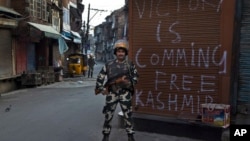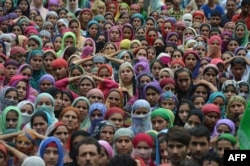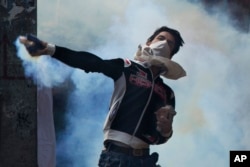Police in Indian Kashmir have detained a prominent human rights activist, Khurram Parvez, two days after he was prevented from leaving India to attend the ongoing session of the U.N. Human Rights Council in Geneva.
Police officials did not say under what charges the spokesperson of Jammu and Kashmir Coalition of Civil Societies (JKCCS) was picked up from his home late Thursday in Srinagar.
On Wednesday, the campaigner was stopped at the New Delhi airport from boarding a flight to Geneva where he was due to submit a report and brief U.N. officials about alleged human rights violations in Indian Kashmir, which has witnessed a wave of unrest since July.
Speaking to VOA before his arrest, Parvez said airport authorities did not cite a reason for stopping him, only telling him it was a directive from the Intelligence Bureau.
Street protests turn spotlight on rights violations
The activist said he feels he is being targeted for the work he has done highlighting alleged violations in Kashmir.
He told VOA “We feel they don’t want people internationally to know all this, what is happening in Jammu and Kashmir.”
Parvez added that “one of the reasons was that they wanted to punish me. I have been going out to different countries and doing this work. They feel bad about my work.”
His group, JKCCS, has drawn attention to thousands of mass graves in remote parts of Indian Kashmir and has called on the government to investigate who the dead were. It has also documented alleged rights violations by Indian troops posted in the Muslim majority region, where anti-Indian sentiment is strong and many favor independence.
The campaigner says a report being submitted by his group to officials at the UNHCR session highlights “how India at the institutional level is involved in carrying out violence against the people of Jammu and Kashmir.”
The president of JKCCS, Parvez Imroz, slammed Parvez’s detention as an attempt to intimidate and restrain his human rights work.
Police use of force against protesters
Indian authorities have not commented on why Parvez was detained or barred from traveling to Geneva. But at the UNHCR session, which began this week, Indian officials have accused Pakistan of instigating the violence in Jammu and Kashmir.
Street protests that have wracked Kashmir in recent weeks have claimed the lives of more than 80 civilians and turned the spotlight on rights violations in the restive region. Most of the people died as security forces tried to quell street protests.
In a statement at the UNHCR earlier this week, India’s ambassador, Ajit Kumar, put the blame for the current wave of unrest on “the cross-border terrorism sponsored by Pakistan which has provided active support since 1989 to separatist groups and terrorist elements.”






